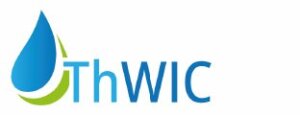The Thuringian Water Innovation Cluster
Logo of the Thuringian Water Innovation Cluster.
Picture: Uni JenaThe innovation cluster, which was launched by the University of Jena in cooperation with the Fraunhofer Institute for Ceramic Technologies and Systems (IKTS) and the University of Applied Sciences Jena, was one of the few proposals to be granted funding as part of the »Clusters4Future« competition, which attracted a total of 120 submissions and is being funded by the German government since 1 February 2023. Over the next nine years, up to 45 million euros in funding will be invested in the development of new water technologies and research into how society is dealing with the increasingly scarce resource. The innovation cluster has more than 20 sub-projects with a focus on the following four fields:
Analysing water
The aim is to develop solutions that will enable water to be analysed comprehensively, quickly, digitally and affordably in the future. This requires sensors that can record water data directly without the need for lengthy laboratory analyses. For example, the »KontiMonit« sub-project team is developing an electrochemical sensor that can be used in municipal sewage treatment plants and for environmental monitoring. The sensors developed in the »MIKA« project are aimed at specific micropollutants using photonic spectroscopy methods.
Purifying water
The researchers are seeking ways to remove anthropogenic wastewater pollutants from wastewater that cannot be captured using the traditional methods of today’s sewage treatment plants. In the »Kerasorb« and »Technical Kidney« sub-projects, which are linked together, the aim is to remove micropollutants by adsorption, while the »UltraStaRK« project aims to render them harmless by complete oxidation.
Evaluating water
The researchers are systematically compiling a comprehensive pool of key figures that expresses a new attribution of value to water; for this purpose, the effort involved in removing pollutants has to be recorded, which can be quantified as a »water footprint«. In addition, sociological criteria will be used to highlight a possible change in awareness in dealing with water.
Understanding and explaining water
One of the key goals pursued by »ThWIC« is to improve »water literacy« by giving citizens extensive knowledge that will empower them to make informed decisions when using the resource. The projects focus on everyday practices of water use in private households, as well as complex water cycles and water-related infrastructure. A greater awareness of water-related issues will also create opportunities for businesses to quickly and appropriately react to anticipated water problems.
